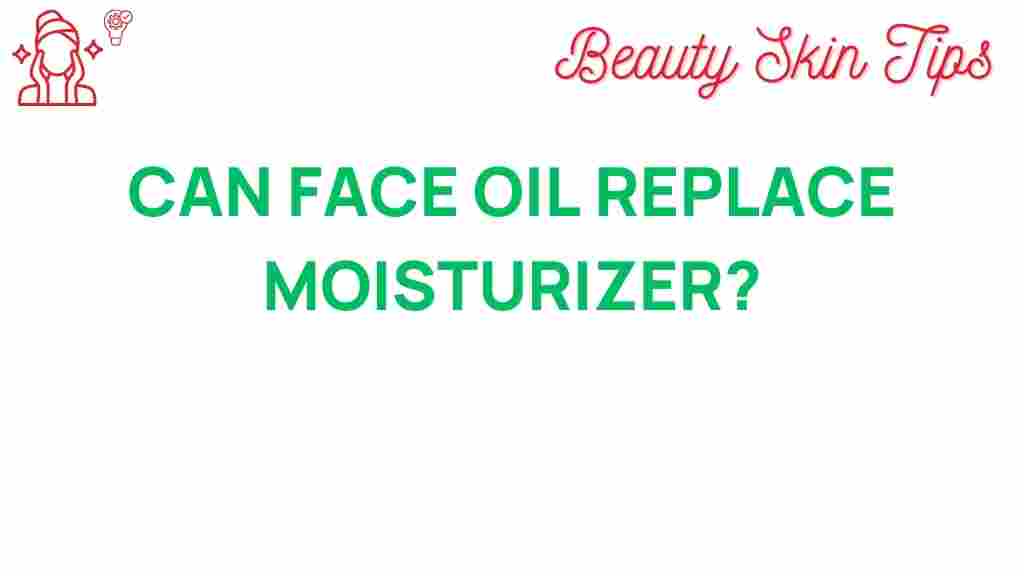Can Face Oil Truly Replace Your Moisturizer? Discover the Truth
When it comes to skincare, the debate between face oil and traditional moisturizer has gained significant traction in recent years. Many beauty enthusiasts swear by the power of oils, claiming they can provide deep hydration and nourishment. But can face oil truly replace your moisturizer? In this comprehensive guide, we’ll explore the benefits of face oil, how to incorporate it into your routine, and whether it can stand in for your beloved moisturizer.
Understanding Face Oil
Face oils are concentrated plant-based oils that can benefit your skin by providing hydration, nourishment, and a protective barrier. They come in various formulations, each designed for different skin types and concerns. Some popular types of face oil include:
- Jojoba Oil: Mimics the skin’s natural sebum, making it great for all skin types.
- Argan Oil: Packed with vitamin E, this oil is excellent for dry and aging skin.
- Rosehip Oil: Known for its regenerative properties, it helps with scars and fine lines.
- Tea Tree Oil: Anti-inflammatory and antibacterial, perfect for acne-prone skin.
The Benefits of Face Oil
Before deciding if face oil can replace your moisturizer, it’s important to understand its benefits:
- Deep Hydration: Oils penetrate deeper into the skin than traditional moisturizers, providing intense hydration.
- Improved Skin Barrier: They help strengthen the skin’s barrier, keeping moisture locked in.
- Natural Ingredients: Most face oils are derived from natural sources, making them suitable for sensitive skin.
- Anti-aging Properties: Many oils contain antioxidants that fight free radicals and promote youthful skin.
Face Oil vs. Moisturizer: What’s the Difference?
While both face oil and moisturizers serve to hydrate and protect the skin, they work in different ways:
- Moisturizers: Typically water-based, they provide hydration and create a barrier to prevent water loss.
- Face Oils: Oil-based, they nourish the skin and can penetrate deeper, offering additional benefits.
So, the question arises: can you use face oil instead of moisturizer? The answer depends on your skin type, concerns, and preferences.
How to Use Face Oil in Your Skincare Routine
If you’re considering integrating face oil into your skincare routine, here’s a step-by-step guide:
- Cleanse: Start with a gentle cleanser to remove dirt and impurities.
- Tone (optional): Use a toner to balance your skin’s pH and prepare it for better absorption.
- Apply Face Oil: Take a few drops of face oil and warm it between your palms. Gently press it onto your skin, focusing on areas that need extra hydration.
- Moisturizer (if needed): If your skin is particularly dry or you prefer a more layered approach, follow up with a light moisturizer.
- SPF (morning routine): Always finish with sunscreen during the day to protect your skin.
Can You Use Face Oil Alone?
Many people wonder if they can solely rely on face oil without using a moisturizer. The answer varies based on individual skin types:
- Oily Skin: Those with oily skin may find that face oil is sufficient for hydration.
- Dry Skin: If you have dry skin, you might want to layer a moisturizer on top for added hydration.
- Combination Skin: You can use face oil on dry areas and a lighter moisturizer on oily zones.
Choosing the Right Face Oil for Your Skin Type
Selecting the right face oil is crucial for achieving the best results. Here are some tips to help you choose:
- For Oily Skin: Look for lightweight oils like jojoba or grapeseed oil.
- For Dry Skin: Opt for richer oils like argan or marula oil.
- For Sensitive Skin: Consider oils that are gentle and soothing, such as chamomile or rosehip oil.
Common Misconceptions About Face Oil
There are several misconceptions surrounding face oil. Here are a few that need clarification:
- Face Oil Causes Breakouts: While some oils can clog pores, non-comedogenic oils like jojoba are safe for acne-prone skin.
- Face Oil Is Only for Dry Skin: Oils can benefit all skin types, providing hydration and nourishment.
- Face Oil Is Too Heavy: Many modern formulations are lightweight and absorb quickly, making them suitable for daily use.
Troubleshooting: When Face Oil Doesn’t Work
If you find that face oil isn’t working for you, consider these troubleshooting tips:
- Patch Test: Always perform a patch test before using a new oil to check for allergic reactions.
- Layering Issues: If your skin feels greasy, you may be using too much oil. Start with just a few drops.
- Wrong Oil Choice: Ensure you’re using an oil suitable for your skin type.
- Check Expiry: Oils can go rancid. Always check the expiration date before use.
Conclusion: The Verdict on Face Oil
So, can face oil truly replace your moisturizer? The answer is nuanced. For some, face oil can serve as a standalone product, providing sufficient hydration and nourishment, especially for those with oily or combination skin. However, for others, particularly those with dry skin, layering a moisturizer on top may still be necessary for optimal hydration.
Ultimately, the key is to understand your skin’s unique needs and preferences. Experiment with different face oils and observe how your skin reacts. With the right product and approach, you may find that face oil can be a game-changer in your skincare routine.
For more skincare tips and product recommendations, feel free to check out our other articles on skincare essentials.
For further reading on the benefits of face oils, visit this resource.
This article is in the category Skincare and created by BeautySkinTips Team
